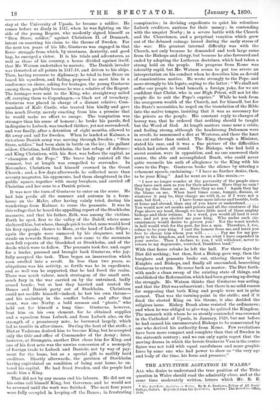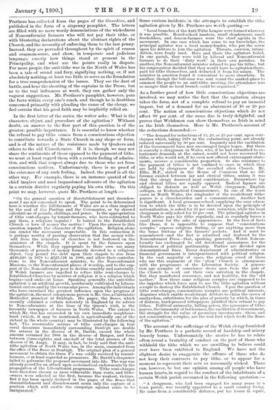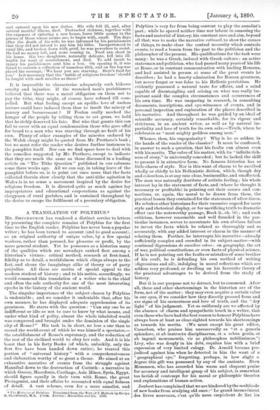THE ANTI-TITHE AGITATION IN WALES.* ALL who desire to understand
the true position of the Tithe question in Wales should read the admirably clear, and at the same time moderately written, letters which Mr. R. E.
• The Anti-Tithe Agitation in Wales. By R. E. Prothero, Fellow of All Fouls' College, Oxford. Reprinted from the Guardian. London ; Thu Guardian Ofhas... 18 89. Prothero has collected from the pages of the Guardian, and published in the form of a sixpenny pamphlet. The letters are filled with no mere wordy denunciations of the wickedness of Nonconformist farmers who will not pay their tithe, or with blustering declarations about the abstract rights of the Church, and the necessity of enforcing them to the last penny. Instead, they are pervaded throughout by the spirit of reason and common-sense, and show, in temperate and judicious language, exactly how things stand at present in the Principality, and what are the points really in dispute. For most people, the anti-tithe war in the North of Wales has been a tale of sound and fury, signifying nothing, or, if not absolutely nothing, at least too little to serve as the foundation for a true comprehension of the issues. They see the dust of battle, and hear the shouting of the captains in the Press; but as to the real influences at work, they can gather only the vaguest suggestions. Mr. Prothero's pamphlet, however, puts the facts within every one's reach, and though he is doubtless concerned primarily with pleading the cause of the clergy, we feel certain that his good faith may he implicitly relied on.
In the first letter of the series, the writer asks : What is the character, object, and procedure of the agitation ? Without doubt, an answer to the first part of this question is of the greatest possible importance. It is essential to know whether the refusal to pay tithe comes from a conscientious objection to contribute towards a State Church in any shape or form, and is of the nature of the resistance made by Quakers and others to the old Church-rates. If it is, though we may not share the sentiments of those opposed to the payment of tithe, we must at least regard them with a certain feeling of admira- tion, and with that respect always due to those who act from conscientious motives. Unfortunately, there is no proof of the existence of any such feeling. Indeed, the proof is all the other way. For example, there is an instance quoted of the chief inspirer and most impassioned advocate of the agitation in a certain district regularly paying his own tithe. On this point we may, however, quote Mr. Prothero at length :—
"On the general question of disestablishment and disendow- ment I am not concerned to speak. The point to be determined here is whether the hill-farmers of Wales are as a class inspired by the zeal of the Puritan and the Covenanter, or by shrewd calculations of pounds, shillings, and pence. Is the appropriation of tithe rent-charges by tenant-farmers, who have contracted to pay them, a religious impulse ? Is hatred to the Established Church or love of money the motive ? Upon the answer to this question depends the character of the agitation. Religion alone can render the movement respectable. In this connection it is perhaps worthy of passing observation that the money with- ield from the ministers of churches is not bestowed on the ministers of the chapels. It is spent by the farmers upon themselves. While they appropriate to their own use many thousands of pounds of money formerly devoted to a religious object, they permit the debt upon their chapels to rise from £246,926 in 1878 to £323,118 in 1886, and allow their contribu- tions to the Nonconformist ministry, to the Nonconformist Missions, to the Nonconformist places of worship, and to the sup- port of the Nonconformist poor to decline sensibly and materially. If Welsh farmers are impelled to refuse tithe rent-charges to Established Churches by motives of religion, it is a religion which begins—and ends—at home. Speaking generally, the anti-tithe agitation is an artificial growth, assiduously cultivated by Libera- tionist orators and by the vernacular press. Among the individuals who have exercised the greatest influence upon the progress of the agitation, the most conspicuous person is Mr. Gee, a Calvinistic Methodist preacher at Denbigh. His paper, the Baner, which recently obtained a certain notoriety in England by its advice to Nonconformists at the time of the Queen's visit, is the favourite newspaper of farmers in North Wales. The extent to which Mr. Gee has succeeded in his own immediate neighbour- hood (which, it may be mentioned, is agriculturally one of the richest in the whole country) may be illustrated by the following fact. The recoverable arrears of tithe rent-charges in four rural deaneries immediately surrounding Denbigh are double the arrears in the diocese of St. Davids, exceed the whole amount returned for 1888 in the diocese of Bangor, and form between three-eighths and one-half of the total arrears of the diocese of St. Asaph. It may, in fact, be truly said that the anti- tithe agitation of North Wales has, in the main, emanated from the office of the Baner at Denbigh. The original plan of a general movement to obtain the three F's was coldly received by tenant- farmers, or at least regarded as premature. Mr. Davitt's eloquence failed to galvanise the proposed movement into life. The way was already paved for an attack upon ecclesiastical endowments by the propagation of the Liberationist programme. Tithe rent-charges were therefore chosen as more vulnerable than rents, and tithe- owners were selected as the first, because the weakest, victims. But it has been openly declared in the pages of the Bauer that disestablishment and disendowment mean only the capture of a position which will enable the campaign against rents to be inaugurated."
Some curious incidents in the attempts to establish the tithe agitation given by Mr. Prot hero are worth quoting :—
" Local branches of the Anti-Tithe League were formed wherever it was possible. Board-school masters, small shopkeepers, small freeholders, and deacon-farmers were the chief agents in the movement. In one case which has come to my knowledge, the principal agitator was a local money-lender, who put the screw upon his debtors to join the agitation. Threats, coercion, intimi- dation, were freely used. Here and there the agitators failed. In one parish, they were told by Liberal and Nonconformist farmers to do their 'dirty work' in their own parishes. In another, the Nonconformist minister refused to pay his tithe ; but his congregation decided that they would have no agitation there, paid his tithe themselves, and deducted it from his salary. The minister in question found it convenient to move elsewhere. In another, though the bell-man was sent round the market-place to summon the people to an anti-tithe meeting, the attendance was so meagre that no local branch could be organised."
As a further proof of how little conscientious objections are involved, we may notice the fact that the agitation always takes the form, not of a complete refusal to pay an immoral impost, but of a demand for an abatement of 10 or 20 per cent. The notion of conscientious objections which do not affect 80 per cent. of the sums due is truly delightful, and proves that Welshmen can show themselves as Irish in mind as the Irish themselves. Here is Mr. Prothero's account of the reductions demanded :—
" The demand for reductions of 15, 20, or 25 per cent. upon rent- charges which, taking 1878 as the culminating point, are already- reduced universally by 30 per cent. Impunity and the vacillation of the Government have now encouraged larger hopes. But there is scarcely a clergyman in Wales, who, if he had submitted to ex- tortionate demands at the outset, would not have recovered his tithe, or who would not, if he even now offered extravagant abate- ments, receive a considerable proportion. So also resistance to the payment of tithes is not confined to cases in which they are held by clergymen of the so-called alien Church. Mr. Ellis, M.P., stated in the House of Commons that no dif- ference existed between lay and clerical tithes, unless it was that the clergy deserved most consideration. Everywhere lay and clerical tithes are equally opposed. Radical laymen are obliged to distrain as well as Welsh clergymen, English colleges, or Ecclesiastical Commissioners. In one of the worst cases in North Wales, the ringleader of the recalcitrant tithe- payers is a churchwarden and a communicant. Another fact is significant. A local grammar-school, supplying the very educa- tion to which the tithe is to be devoted upon the principle of nationalisation, is asked for 25 per cent. reduction, while the local clergyman is only asked for 10 per cent. The principal agitator in North Wales pays his tithe regularly, and as regularly leaves a small arrear for the sake of appearances. In the face of facts like these, it is impossible to suppose that ` conscientious scruples' express religious feeling, or are anything more than the brass buttons of the farmers' pockets. And it must be remembered—and the fact is admitted and deplored by the Nonconformist Press—that, speaking generally, Welsh Noncon-. formity has exchanged its old devotional earnestness for the bitterness of political partisanship. Parties are divided upon denominational lines. Every department of administrative or financial government is interpenetrated with political religion. In the vast majority of cases, the religious creed of those who use this argument of the ' alien ' Church is synonymous with the programme of the Liberation Society. A genera- tion ago scruples of conscience drove men from the pale of the Church to work out their own salvation in the chapels. But they manifested reverence, and not hostility, for the ` old mother.' Now these same religious scruples are supposed to be the impulses which force men to use the tithe agitation without scruple to destroy the Established Church. Upon the question of tithe rent-charges, conscientious scruples are political interests, disguises which enable recalcitrant debtors to claim the crown of martyrdom, substitutes for the plea of poverty by which, in times of distress, hard-pressed tithepayers justified their refusal to pay tithes. Political animosity, falling prices, the ignorance of tithe- payers, the immunity of lawlessness, the vacillation of Government_ the struggle for the value of pecuniary investments—these, and not conscientious scruples, are the real fuel which feeds the flame of the agitation."
The account of the sufferings of the Welsh clergy furnished by Mr. Prothero is a pathetic record of hardship and misery bravely borne. Unfortunately the stories he has to relate often reveal a brutality of conduct on the part of those who withhold the tithe which we are unwilling to believe could ever have been exhibited in England. We have not the slightest desire to exaggerate the offence of those who do not keep their contracts to pay tithe, or to appear for a moment to represent their acts as necessarily wicked. There can, however, be but one opinion among all people who have human hearts, in regard to the conduct of the inhabitants of a certain Welsh parish recounted in the following quotation :-
" A clergyman, who had been engaged for many years in a town parish, was recently appointed to a small country living. He came from a considerable distance, put his house in repair,.
and entered upon his new duties. His wife fell ill, and, after several months' illness, died. Protracted sickness, together with the expenses of entering a new house, leave little money in the purses of those whose means are, to begin with, small. Ten days after the death of his wife, he was informed by his parishioners that they did not intend to pay him his tithe. Inexperienced in rural life, and broken down with grief, he was powerless to resist. He had no money left, and none coming in. Food ran short in his home. His two daughters, naturally delicate, fell into ill- health for want of nourishment, and died. To add insult to injury his parishioners sent him a box. On opening it, it was found to contain a collection of nameless filth, and on the top was placed the message, We hear you are starving. Here's food for you.' Is it necessary that the battle of religious freedom' should be fought with such missiles as these F"
It is impossible to characterise adequately such hideous cruelty and injustice. If the wretched man's parishioners
believed that there was a moral obligation on them not to pay the tithe, they might, of course, have refused till com- pelled. But what feeling except an apelike love of useless torture could have induced them thus to insult the misery of penury and bereavement ? If Fonlon really mocked the hunger of the people by telling them to eat grass, we hold that he richly deserved his fate. But who that grants this can fail to cover with an equal condemnation those who gave offal for bread to a man who was starving through no fault of his own. Plenty of other examples of the miseries endured by the Welsh clergy might be quoted from Mr. Prothero's book ; but we must refer the reader who desires further instances to the pamphlet itself. Nor can we find space here to deal with the remedies suggested by Mr. Prothero, except to indicate that they are much the same as those discussed in a leading article on " The Tithe Question" published in our columns some three weeks ago. All we can say, in taking leave of the pamphlet before us, is to point out once more that the facts collected therein show clearly that the anti-tithe agitation in Wales is in no sense a movement inspired by the desire for religious freedom. It is directed quite as much against lay impropriators and educational corporations as against the clergymen of rural parishes, and is sustained throughout by the desire to escape the fulfilment of a pecuniary obligation.
















































 Previous page
Previous page